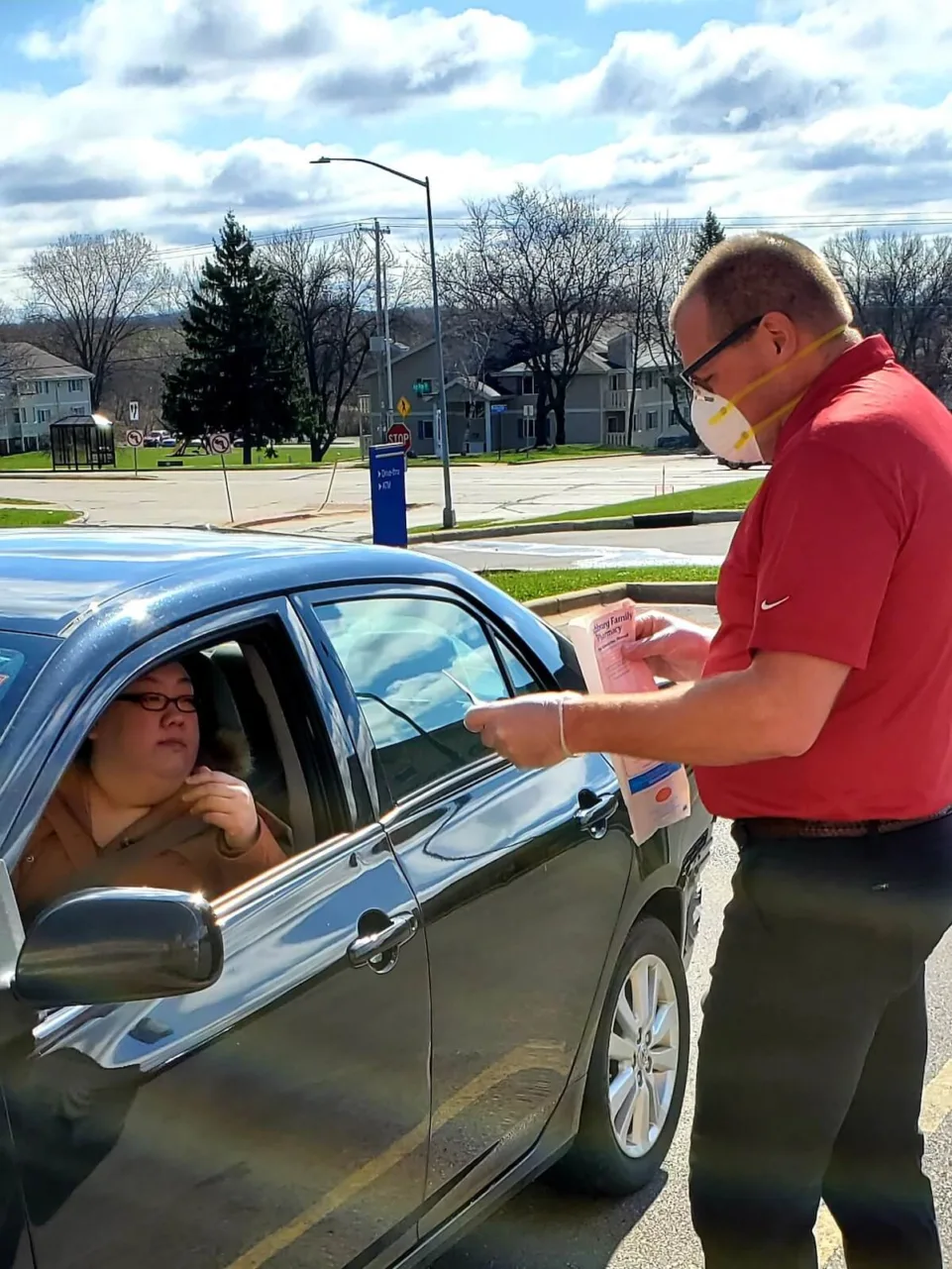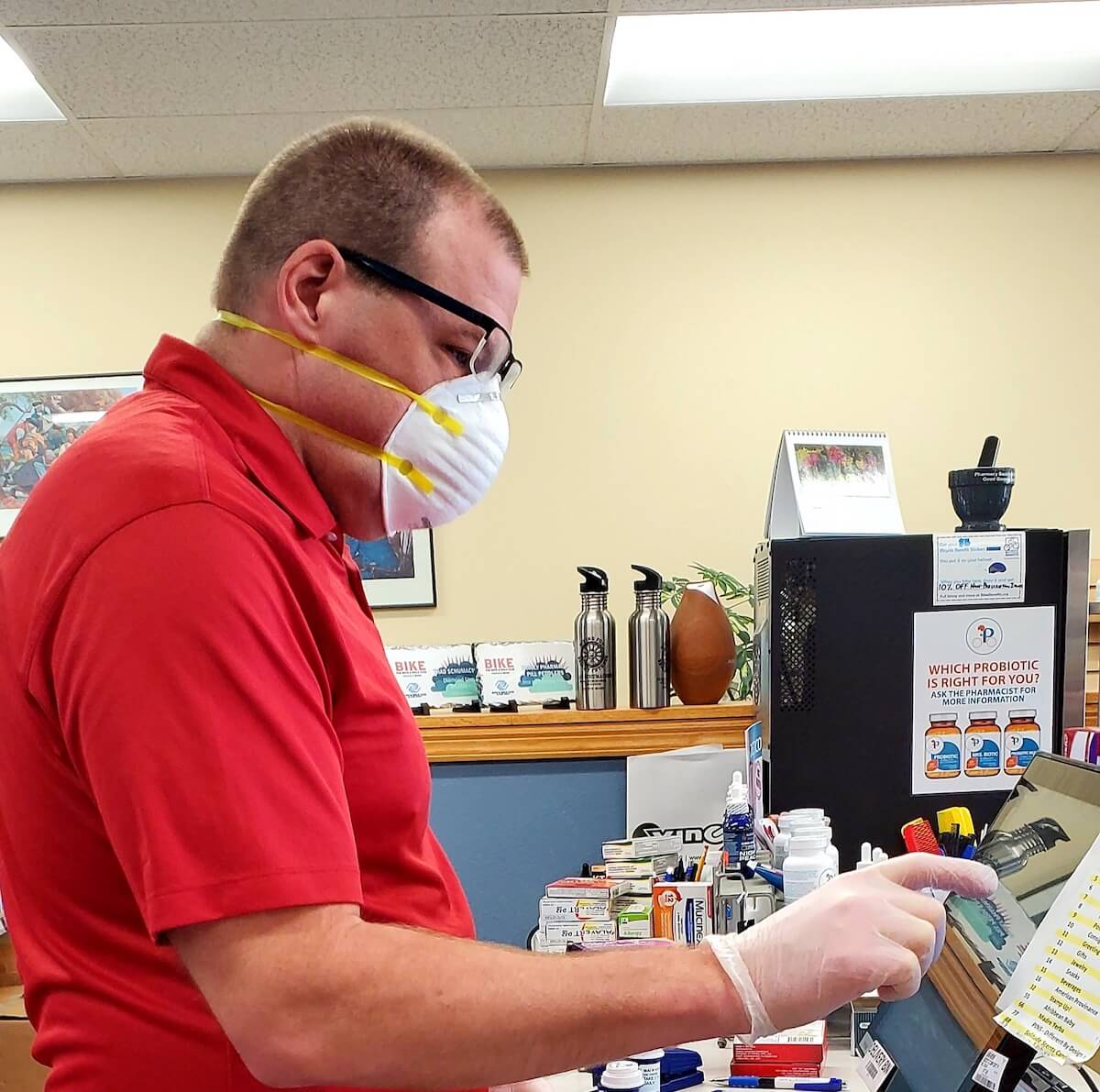
#image_title
Deliveries, curbside pickups only, credit cards preferred.
Thad Schumuchar, a pharmacist and owner of the Fitchburg Family Pharmacy sums up what it’s like to stay open as an essential business during the coronavirus pandemic.
“We use the term ‘COVID Crazy’ because it feels like you are on 100 percent of the time,” Schumacher said. “By the end of the day, you are just spent.”
On a recent Friday night, Schumacher closed up the Fitchburg Family Pharmacy around 6 p.m. He then got in his car for the final part of his day, at-home deliveries. Deliveries now average around 35 a day. He made the last four of the day on his way home.
“I pretty much deliver to everyone on my street, now,” Schumacher said. “We have seen an increase in deliveries and that has been an adjustment for us.”
On March 25, Gov. Tony Evers issued the safer-at-home order. But even before people were encouraged to stay at home, business began to be grouped into two separate categories: non-essential versus essential. Pharmacies fell into the latter group.
Independent pharmacies like Fitchburg Family Pharmacy across the state are part of a clinically integrated pharmacy network that are taking similar steps during this time. Schumacher’s adjustment offers a glimpse of how essential businesses quickly adapted to staying open amidst a pandemic.
At first he thought they could keep the pharmacy open, allowing customers to come inside to make their purchases. He removed chairs, put barriers in front of registers and taped squares on the floor to indicate where customers should stand in line.
But controlling the flow of people and making sure people were maintaining 6 feet of separation, proved difficult. He said about 75 percent of customers complied.
The pharmacy now operates on a call ahead, curbside delivery basis only. With three full-time and seven part-time employees, he said he doesn’t have a deep bench. His decision was based on continuing to serve his customers and keeping his staff safe. He is the only one who goes out to customers’ vehicles to make deliveries.
“It is working remarkably well,” Schumacher said. “I’m getting my steps in.”
He strongly encourages credit card transactions. It takes more time to punch in the numbers and it costs him 2.5 percent of all credit card sales to process, “but it is a cleaner transaction.” Roughly 99 percent of transactions are now done by credit card, he said.
One of the biggest adjustments for his staff has been the change in the delivery process to assisted living and retirement facilities. At first, those making deliveries would be stopped at the front desk. Their temperature would be taken and they were asked a few questions. If they were temperature free, they proceeded to the individual rooms to make the delivery.
Now, the deliveries are left at the front desk. While this has sped up the time in which drivers can make deliveries, it requires more prep time at the pharmacy. To avoid privacy violations, packing is done differently, he said.
And similar to how customers have left bread shelves and dairy aisles depleted as they rush to stock their kitchens with food, the same thing is happening with prescription drugs, Schumacher said.
“What we are seeing is people asking for their medications much earlier than they would need it … kind of like toilet paper,” he said. “We decide on a case-by-case basis if the supply chain can handle it.”
Some of the only customers he is allowing inside the pharmacy are customers who need monthly injections such as long-acting antipsychotics or vivitrol, a medication that fights opioid and alcohol addiction.
He has a room set up with a chair that he wipes down prior to administering the shots.
The pharmacy is open Monday through Friday and for four hours on Saturday. He keeps his cell phone number posted on the door and the after-hours pharmacy voicemail allows customers to send messages to his cell phone. He said he routinely tells people the pharmacy can’t be open all the time but he is always available.
“These are definitely unprecedented times,” Schumacher said. “But if we all pitch in and do our part we will come out on the other side of this stronger.”


New Biden rules deliver automatic cash refunds for canceled flights, ban surprise fees
In the aftermath of a canceled or delayed flight, there’s nothing less appealing than spending hours on the phone waiting to speak with an airline...

One year on the Wienermobile: The life of a Wisconsin hotdogger
20,000+ miles. 16 states. 40+ cities. 12 months. Hotdogger Samantha Benish has been hard at work since graduating from the University of...

Biden makes 4 million more workers eligible for overtime pay
The Biden administration announced a new rule Tuesday to expand overtime pay for around 4 million lower-paid salaried employees nationwide. The...

‘Radical’ Republican proposals threaten bipartisan farm bill, USDA Secretary says
In an appearance before the North American Agricultural Journalists last week, United States Department of Agriculture (USDA) Secretary Tom Vilsack...




